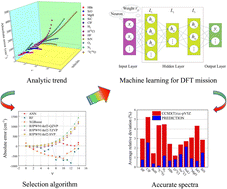When using ab initio methods to obtain high-quality quantum behavior of molecules, it often involves a lot of trial-and-error work in algorithm design and parameter selection, which requires enormous time and computational resource costs. In the study of vibrational energies of diatomic molecules, we found that starting from a low-precision DFT model and then correcting the errors using the high-dimensional function modeling capabilities of machine learning, one can considerably reduce the computational burden and improve the prediction accuracy. Data-driven machine learning is able to capture subtle physical information that is missing from DFT approaches. The results of 12C16O, 24MgO and Na35Cl show that, compared with CCSD(T)/cc-pV5Z calculation, this work improves the prediction accuracy by more than one order of magnitude, and reduces the computation cost by more than one order of magnitude.

